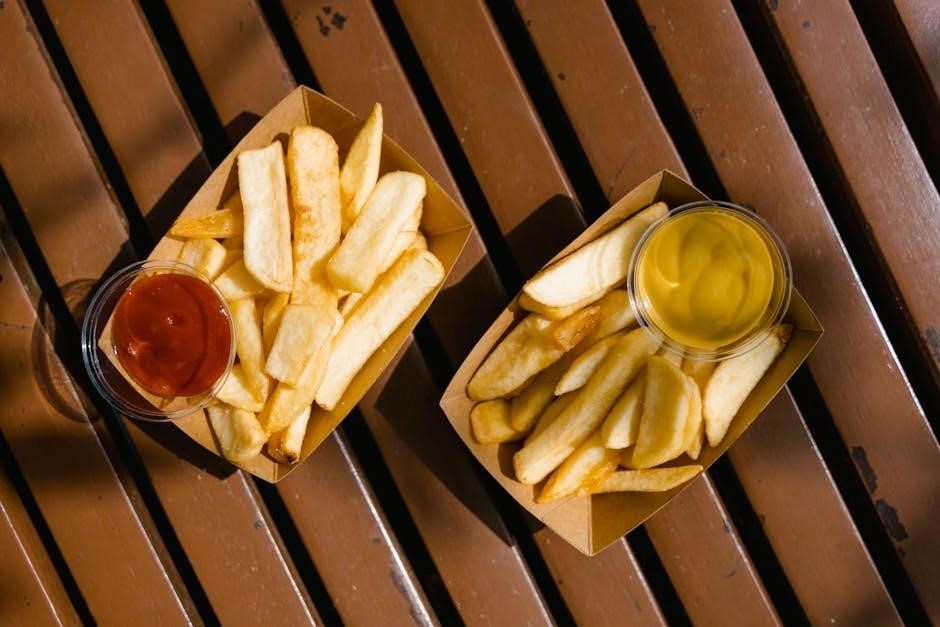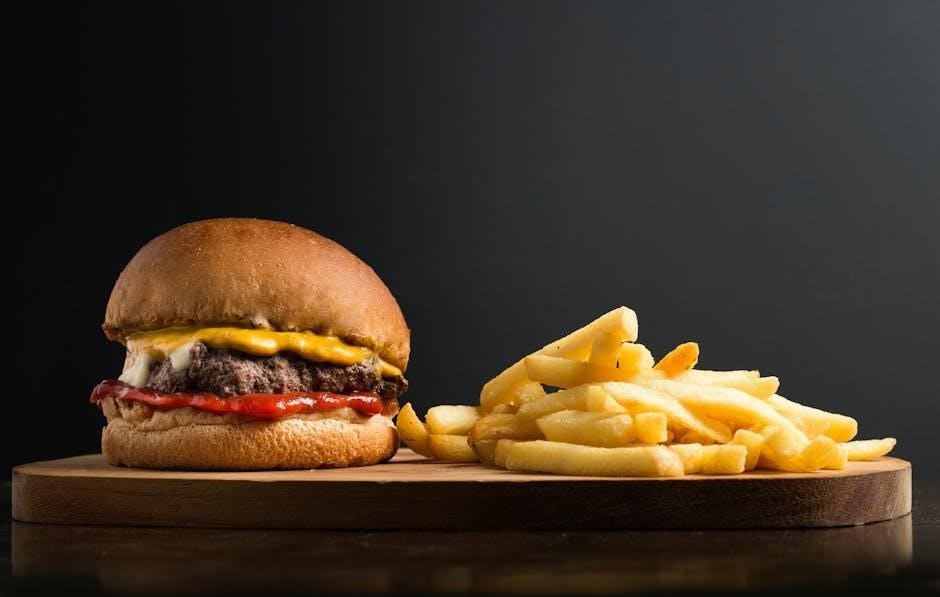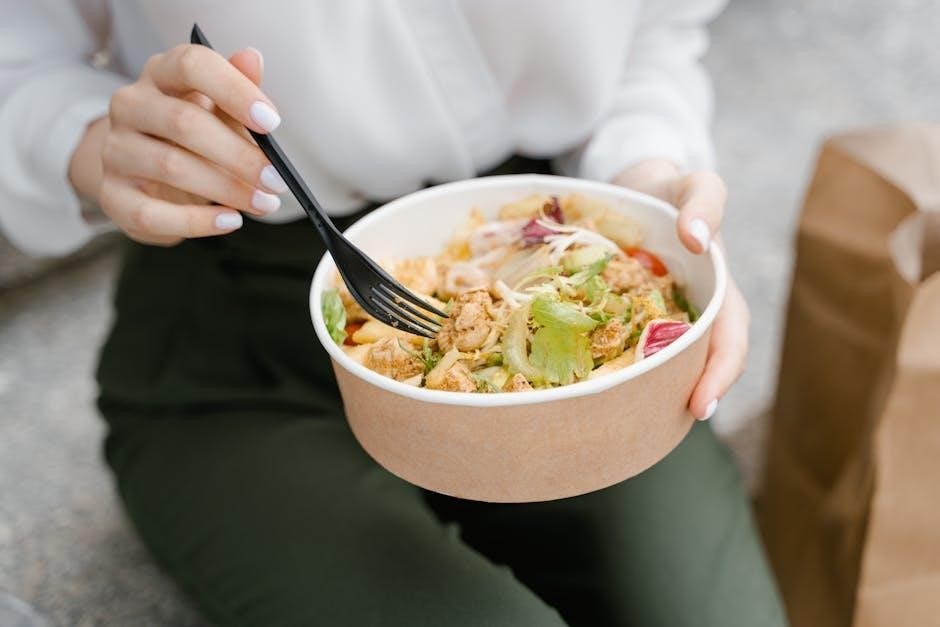A 3000 calorie meal plan is a structured dietary approach designed for individuals requiring high energy intake. It ensures balanced nutrition, tailored to specific health goals and lifestyles.
1.1 What is a 3000 Calorie Meal Plan?
A 3000 calorie meal plan is a dietary strategy designed for individuals with high energy needs, such as athletes or those aiming to gain weight. It involves consuming 3000 calories daily, split across 6 meals and snacks, ensuring balanced nutrition. Each main meal typically ranges from 700 to 800 calories, while snacks are around 200 to 300 calories. The plan focuses on protein-rich foods like chicken, fish, eggs, and cottage cheese, alongside complex carbs and healthy fats. It’s tailored to support muscle growth, recovery, and energy needs, often created by professionals like dietitians to meet specific goals and lifestyles.

1.2 Importance of a Structured Meal Plan

A structured meal plan is crucial for achieving nutritional balance and health goals. It ensures consistent energy intake, preventing under- or overeating. By organizing meals and snacks, individuals can maintain discipline, reduce food waste, and save time. A well-planned diet also promotes better digestion and nutrient absorption, supporting overall well-being. For those following a 3000 calorie diet, structure helps in evenly distributing calories and nutrients throughout the day, which is essential for muscle growth, recovery, and sustained energy levels. It also aids in tracking progress and making necessary adjustments, ensuring the diet remains effective and aligned with personal objectives.

Benefits of a 3000 Calorie Diet
A 3000 calorie diet supports muscle growth, enhances energy levels, and aids in recovery. It is ideal for active individuals seeking to gain mass and improve performance.

2.1 Supporting Muscle Growth and Recovery
A 3000 calorie diet provides the necessary fuel for muscle growth and recovery, particularly for athletes and bodybuilders. With adequate protein intake, it promotes muscle synthesis and repair.
2.2 Enhancing Daily Energy Levels
A 3000 calorie meal plan is ideal for individuals with high energy demands, such as athletes or those with active lifestyles. By providing ample carbohydrates, proteins, and fats, it ensures sustained energy levels throughout the day. Balanced macronutrient distribution helps prevent energy crashes, while protein supports muscle function and recovery. Incorporating complex carbs like whole grains and legumes provides a steady energy supply, reducing fatigue. Additionally, healthy fats and fiber contribute to long-lasting vitality. A well-structured meal plan avoids energy fluctuations, keeping you productive and focused. This approach is particularly beneficial for those needing consistent physical and mental performance, making it a cornerstone for maintaining daily energy and overall well-being.

Structuring Your 3000 Calorie Meal Plan
Organize your meals to meet energy needs, ensuring balanced nutrition. Distribute calories across 5-6 meals, including breakfast, snacks, and dinner. Prioritize nutrient-dense foods for optimal results and satisfaction.
3.1 Daily Meal Distribution and Timing
Distributing meals evenly throughout the day is crucial for maintaining energy levels and supporting muscle recovery. A typical 3000-calorie plan involves 5-6 meals, including breakfast, snacks, and dinner. Breakfast should be nutrient-dense to kickstart metabolism, while post-workout snacks aid recovery. Meals should be spaced every 2-3 hours to maintain stable blood sugar levels and prevent excessive hunger. Timing meals around workouts ensures optimal energy use and muscle recovery. Consistency in meal timing supports overall metabolic health and helps regulate hunger cues, making it easier to stick to the plan. Proper distribution ensures no meal is overly calorie-heavy, promoting balanced nutrition and digestion.
3.2 Balancing Macronutrients for Optimal Results
Balancing macronutrients is essential for a 3000-calorie meal plan to ensure energy, muscle growth, and overall health. Aim for a distribution of 45-55% carbohydrates, 30-35% protein, and 20-25% fats. Carbohydrates, the primary energy source, should include complex carbs like whole grains, fruits, and vegetables. Protein is crucial for muscle repair and growth, with sources like lean meats, fish, eggs, and legumes. Healthy fats, such as avocados, nuts, and olive oil, support hormone production and satiety. Fiber intake should also be prioritized to aid digestion and control hunger. By maintaining this balance, individuals can optimize their diet for performance, recovery, and long-term health, ensuring sustained energy levels and nutrient adequacy.

Tips for Successfully Following the Meal Plan
Consistency, meal prepping, and hydration are key. Plan meals weekly, prep in advance to avoid deviations, and drink plenty of water to support digestion and energy levels.
4.1 The Role of Meal Prepping
Meal prepping plays a vital role in maintaining a 3000-calorie diet. By preparing meals in advance, individuals can ensure consistency and avoid deviations from their dietary plan. It saves time during the week and helps in portion control, which is crucial for maintaining the right caloric intake. Prepping also reduces the temptation to opt for unhealthy or convenience foods, keeping the diet on track. Additionally, it allows for better organization of macronutrients and micronutrients, ensuring each meal is balanced and nutritious. A well-prepped meal plan can significantly enhance adherence to the diet, making it easier to reach health and fitness goals effectively;
4.2 Staying Hydrated Throughout the Day
Hydration is essential for overall health and plays a crucial role in a 3000-calorie meal plan. Drinking enough water supports digestion, nutrient absorption, and energy levels. Even mild dehydration can lead to fatigue, which may hinder physical performance and daily activities. Aim to consume at least 8-10 glasses of water daily, adjusting for activity level and climate. Incorporating hydrating foods like fruits and vegetables can also contribute to fluid intake. Staying hydrated helps maintain metabolic efficiency, ensuring the body processes calories and nutrients effectively. It also prevents overeating by curbing unnecessary hunger pangs. Making hydration a priority complements the meal plan, promoting better overall health and performance.

Essential Grocery List for a 3000 Calorie Diet
A well-stocked pantry is vital for a 3000-calorie diet. Focus on whole grains, lean proteins, healthy fats, and fresh produce to ensure balanced and nutritious meals.
5.1 Staple Foods and Pantry Essentials
Staple foods form the backbone of a 3000-calorie diet. Whole grains like brown rice, quinoa, and oats provide sustained energy. Canned goods such as beans and tomatoes add versatility. Nuts and seeds, including almonds and chia seeds, offer healthy fats and protein. Dried fruits like raisins and dates serve as quick snacks. Protein-rich staples like eggs, Greek yogurt, and cottage cheese are essential for muscle maintenance. Healthy oils, including olive and coconut oil, are vital for cooking and adding calories. Lastly, spices and seasonings enhance flavor without extra calories, making meals more enjoyable and varied.
5.2 High-Protein Foods and Supplements

High-protein foods are crucial for muscle growth and recovery. Chicken breast, lean beef, and fish like salmon or tilapia are excellent sources. Eggs, Greek yogurt, and cottage cheese also provide high-quality protein. Plant-based options such as tofu, lentils, and legumes are great for variety. Protein supplements like whey powder can help meet daily goals efficiently. Additionally, creatine is a popular supplement to enhance muscle strength and performance. These foods and supplements ensure adequate protein intake, supporting muscle maintenance and overall health in a 3000-calorie diet.
A well-structured 3000-calorie meal plan effectively supports muscle growth, energy, and overall health. Consistency and patience are key to achieving long-term success and sustained progress.
6.1 Recap of the Meal Plan’s Effectiveness
A well-structured 3000-calorie meal plan proves highly effective for individuals seeking to gain weight, build muscle, or maintain high energy levels. By distributing calories across 6 meals and snacks, it ensures sustained energy and supports muscle recovery. The plan emphasizes balanced macronutrients, with a focus on protein, carbohydrates, and healthy fats, to optimize growth and performance. Meals like grilled chicken, lean beef, and fish provide essential protein, while complex carbs from whole grains and vegetables offer steady energy. Snacks such as nuts and Greek yogurt keep metabolism active. This approach not only aids in weight gain but also promotes overall health, making it a reliable choice for those with high calorie needs.
6.2 Encouragement for Consistency and Patience
Adhering to a 3000-calorie meal plan requires dedication and patience, as results may take time to manifest. It’s important to celebrate small victories and stay committed, even when progress feels slow. Consistency is key to achieving your goals, whether it’s muscle growth, weight gain, or improved energy levels. Remember, a high-calorie diet is not just about eating more but fueling your body with nutrient-dense foods. Stay hydrated, prioritize meal prep, and focus on balanced macronutrients to support your journey. Patience and persistence will ultimately lead to long-term success, so keep pushing forward and trust the process.